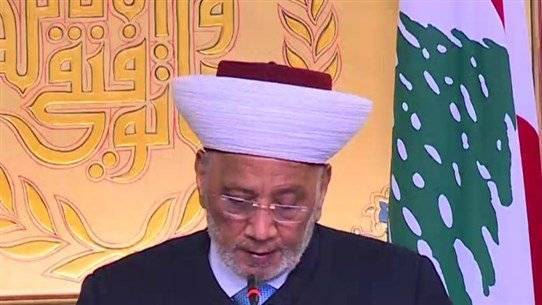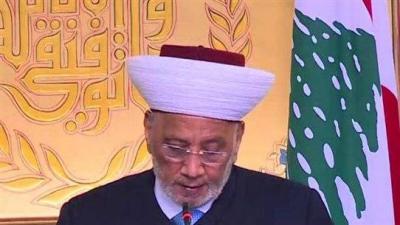A meeting for Sunni MPs was held at Dar Al-Fatwa at the invitation of the Grand Mufti of the Lebanese Republic, Sheikh Abdel Latif Deryan, who began the session by reciting Surah Al-Fatiha in memory of the victims of the boat that sank off the coast of Tartus. In his speech, Mufti Deryan addressed the Sunni MPs, stating: "There must be a new president for the republic, and you are responsible for his presence or bringing him in; you will be at the forefront of the responsibility for his absence for any reason." He added: "The qualifications of the president are now known: safeguarding the principles of the Taif Agreement, the constitution, coexistence, and the national, Arab, and international legitimacies of Lebanon. These cannot be compromised, no matter how differing opinions and positions may arise, and it is essential to end the fabricated sectarian and divisive conflict among authorities and return to the constitution." He continued: "I wanted us to be a united hand and a single voice in achieving what the people aspire to, forming a government, and electing a president to address the crises suffered by citizens at all levels. My concern is for us to have a clear voice in forming national unity in the toughest circumstances, and it is not hidden from you that the survival of nations and states depends on the effectiveness of their constitutional institutions, foremost of which is the presidency of the republic, which has great importance."
He also pointed out, "We have entered the reality of a failing state, and we are rapidly heading toward a state of non-existence. Arabs and the world may soon ignore Lebanon's existence due to poor political management on all levels," calling for "no infringement on the powers of the presidency of the government, and everyone should work to facilitate the mission of the designated president. We hope for good in forming a government."
Here is the complete text of his speech: "Praise be to Allah, Lord of the Worlds, and peace and blessings be upon all the prophets and messengers of Allah, upon our intercessor, our prophet, and our role model Muhammad the Seal of the Prophets and Messengers, and upon his family and companions, and all who follow them with goodness until the Day of Judgment.” He addressed the MPs, saying: "I thank all of you for attending this welcoming house. This house has become accustomed to being present and influential in national events that affect the public good of the citizens and how it positively impacts, except with you, who ought to represent the people after difficult elections amid this catastrophe that the nation has never witnessed before. We meet today for a goal that is far beyond sectarian or partisan narrowness. I wanted to unite over lofty national goals. We are, at heart, people of counsel and cooperation. We must unite, no matter how our views differ, for our homeland is in danger, our state is in danger, and our citizens are in extreme misery. Responsibilities are shared. I wanted us to be a united hand, a single voice in achieving what the people aspire to, forming a government, and electing a new president for the republic to address the crises the citizens suffer from on all levels—economic, social, living, and developmental."
He emphasized that there are many among the esteemed MPs with whom you can cooperate to unify on the qualified new president. His concern is for us to have a clear voice, according to our traditions and norms in forming national unity in the toughest challenges and circumstances. He added: "It is no secret that the survival of nations and states relies on the effectiveness of their constitutional institutions, headed by the presidency of the state. The president is a symbol of the country and the protector of its constitution, upon which he takes an oath. I point out here the extreme importance of the presidency of the republic in Lebanon specifically, for the Christian president is a symbol and reality of coexistence upon which the system agreed upon by the Lebanese. The Arabs view him with recognition and appreciation for the Lebanese experience because he is the only Christian president in the Arab world."
He noted that "the president in the Lebanese political system is the head of the existing constitutional institutions. Their functioning does not regulate nor balance except with his presence, through the election by the Parliament for him. For the necessity of electing a new president, it is essential to maintain the existence of the Lebanese system and Lebanon's reputation among Arabs and the international community. Crises have multiplied, exceptions have increased, and cases of absence or weakness, or stagnation in all institutions and facilities have proliferated, such that we have entered into the status of a failing state and are quickly headed toward non-existence. The Arabs and the world are about to ignore Lebanon due to poor political management on all levels."
He reiterated: "There must be a new president for the republic, and you are responsible for his presence or bringing him; you will be at the forefront of the responsibility for his absence for any reason. A new president must exist who preserves the constants of the homeland and the state. So, dear MPs, contribute—this is your responsibility—to the change and to restoring the presidency of the republic to respect it and its role internally and towards the outside."
He further elaborated: "The president we want has clear qualifications, and you all know them better than I do. The qualifications are: First, preserving the principles of the Taif Agreement and the constitution, coexistence, and the national, Arab, and international legitimacies of Lebanon. These cannot be compromised, no matter how differing political opinions and positions arise, for they are a guarantee for preserving the regime and national identity. Second, ending the artificial and sectarian conflict and returning to the constitutional principle of separation and cooperation of powers. Third, embodying the characteristics of a public servant both personally and politically, for a public servant is, as political scientists say, governed by the ethics of the mission and the ethics of responsibility. Fourth and finally, possessing wisdom, national responsibility, integrity, and the ability to unite the Lebanese, fully engaging with constitutional authorities and available institutions and facilities to draw the country out of its crises and prevent it from complete collapse. There must be a president with these qualities, or we may be surprised by the disappearance of the regime and then the state!"
He said: "The country is going through significant dangers, necessitating us to strengthen the unity of the Islamic and national front, and we call for not infringing on the powers of the presidency of the government and doing all we can to assist the designated president in facilitating his mission. This is a shared responsibility that falls on everyone's shoulders, and we are hopeful and optimistic about the swift formation of the new government in the nearest possible days, for our homeland, Lebanon, needs a fully empowered government during these harsh and difficult circumstances, not just a caretaker government."
He emphasized that "Lebanon can only stand through consensus; there is no salvation except through its unity, far from tension and sectarian discourse, and provocative agitation. Let us be for our homeland and our people to keep our nation. Let our people trust us. A new president must come—by your will and votes—whom we can trust for his fidelity to the constitution, respect for the Taif Agreement, coexistence, the Arab identity of Lebanon, and its international relationships; integrity is among his most important traits. We want a president who is not part of the problem or a cause of it. Thank you for your kind attention; let’s consult to overcome confusion and tension and to preserve our homeland and stability, our independence, and the life of our citizens."
At the end, a closed session was held for discussions between the MPs and Mufti Deryan.




